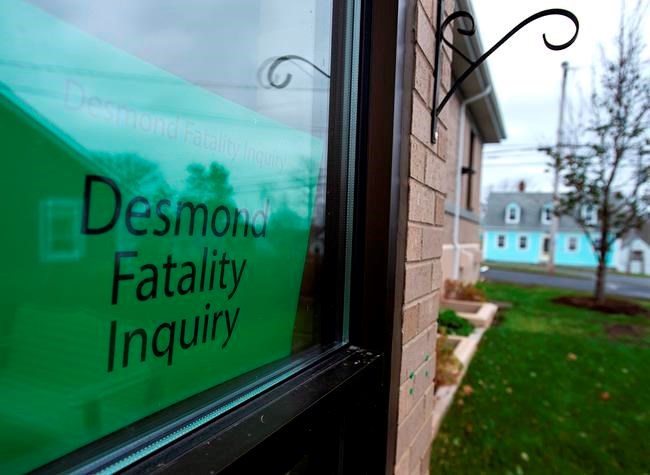PORT HAWKESBURY, N.S. ÔÇö The tragic case of a former soldier in Nova Scotia who killed his family and himself in 2017 was predictable and preventable, a domestic violence expert told an inquiry Wednesday.
Dr. Peter Jaffe, a psychologist at Western University in London, Ont., was testifying before a provincial inquiry investigating why Afghanistan war veteran Lionel Desmond fatally shot his mother, wife, daughter and himself almost five years ago.
In a report Jaffe wrote for the inquiry, he concluded that many red flags were ignored or overlooked.
The fatality inquiry has focused much of its attention on Desmond's long struggle with post-traumatic stress disorder, but it has also been tasked with determining whether his family had access to domestic violence intervention services and whether the health-care providers who interacted with them were properly trained.
"There were multiple missed opportunities for interventions related to domestic violence that was clearly a major aspect of this case," Jaffe wrote in the report.
"There had been no specialized assessments that had fully considered Desmond's domestic violence or the needs of his wife and daughter. No specialized domestic violence services were offered to them, other than an RCMP officer suggesting victim services."
Jaffe found that Desmond, 33, presented 20 risk factors associated with domestic homicide, out of 41 factors developed by the Ontario Domestic Violence Death Review Committee. Among other things, Desmond reported severe verbal and physical abuse during his childhood, a key risk factor linked to domestic violence.
As well, he was going through a marital separation, was unemployed and suffered from major depression and other mental health problems, including a borderline personality disorder and severe PTSD.
"It doesn't mean that everybody who has PTSD is involved in domestic violence," Jaffe told the inquiry Wednesday. "It increases the risk, but it's usually with other factors, (including) having access to weapons."
The report also points to Desmond's prior threats to kill himself, his sexual jealousy and a history of domestic violence that appeared to be overshadowed by his struggles with mental health issues.
The inquiry has heard that Desmond repeatedly denied physically abusing his wife, Shanna. And she confirmed that assertion when the couple sought help for their troubled relationship. Jaffe's report, however, makes it clear that domestic violence can include psychological and emotional abuse.
Some of the professionals who had contact with Desmond used euphemisms to describe the warning signs of domestic abuse that "foreshadowed the ultimate tragedy," Jaffe wrote. As a result, the real problem was not named.
"The terms violence and abuse were rarely used or expanded upon in interviews with both Lionel and Shanna Desmond," the report says.
Jaffe, former director of the Centre for Research and Education on Violence against Women and Children, concluded that the professionals who dealt with the Desmond family focused their work almost entirely on the former infantryman's mental health problems rather than domestic violence.
He calculated that Desmond had contact with 40 mental-health professional in New Brunswick, Quebec and Nova Scotia from the time he was diagnosed with PTSD while serving in the military in 2011 to his final days in 2017.
"From 2011-2017, no one really addressed the extent of domestic violence and abuse," the report says. "Most professionals did not explore what was really happening between Cpl. Desmond and his wife ÔÇö as well as what their daughter was living with in these circumstances."┬á
Though Shanna Desmond repeatedly said she was not afraid of her husband, at one point she reached out to police after he hinted at suicide. That incident prompted officers to remove his weapons for a short time.
Jaffe, who has studied domestic violence issues for 45 years, said that incident should have been flagged for followup, but that never happened.
"It was shocking that any professional would think he should have a firearm licence in the context of all the available information about the risks he presented," the report says. 
"In the two years leading up to the domestic homicides-suicide, there were multiple reports expressing significant concerns about Desmond's declining mental health and increasing stressors in his family, finances and living circumstances."
According to Jaffe's report, half of all domestic homicide victims don't see the risk they face because they are often too busy trying to manage the perpetrator.
Between 2010 and 2019, there were 25 homicides in sa╣·╝╩┤½├¢ where a perpetrator killed multiple family members, resulting in 69 victims, the report notes. Men were the perpetrators in all but one case. These men were most often between the ages of 25 and 34, had a history of domestic violence and were facing an actual or pending separation in a rural setting.
This report by The Canadian Press was first published Nov. 3, 2021.
ÔÇö By Michael MacDonald in Halifax.
The Canadian Press



